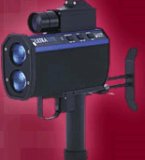Article from: www.thenewspaper.com/news/06/649.asp
9/12/2005
BBC Documents Errors in US Laser Speed Guns
British journalists test the American version of a popular laser speed gun and find it is inaccurate a third of the time.
 The BBC program "Inside Out" tonight will air results of tests of one of the most popular laser speed detection guns used by police forces in the US and UK. In the program, a pair of American specification LTI 20-20 guns, manufactured by Laser Technology Inc. of Colorado, point at the same moving vehicle but record substantially different speeds.
The BBC program "Inside Out" tonight will air results of tests of one of the most popular laser speed detection guns used by police forces in the US and UK. In the program, a pair of American specification LTI 20-20 guns, manufactured by Laser Technology Inc. of Colorado, point at the same moving vehicle but record substantially different speeds.
The source of the error is well-known. When the aiming point of the laser gun, which is designed to be hand-held, moves or "slips" across the target vehicle, an extra distance is either added to or subtracted from the speed calculation. A tiny movement can add up to a substantial difference. Engineering Professor John Brignell describes the amount of motion needed to cause a slip error at a distance of 500 meters: "Very roughly, without doing any calculations, we are talking about the camera moving about the thickness of a human hair."
The hosts of the BBC program were able to clock a stationary car at 6 MPH. In tests of a moving vehicle, the laser gun produced erroneous readings almost a third of the time, displaying speeds that were off by as much as 26 MPH.
The devices can be upgraded and used as mobile speed cameras, particularly in the UK where an estimated five million drivers have been convicted based on laser speed readings over the past five years.
"I am 100 percent certain that these devices are not suitable for gathering legal evidence of vehicle speeds," said Paul Smith, founder of the Safe Speed road safety campaign. "They make mistakes and the BBC film proves it. Millions of drivers will be entitled to refunds, licence points removed and in some cases a large amount of compensation."
 The BBC program "Inside Out" tonight will air results of tests of one of the most popular laser speed detection guns used by police forces in the US and UK. In the program, a pair of American specification LTI 20-20 guns, manufactured by Laser Technology Inc. of Colorado, point at the same moving vehicle but record substantially different speeds.
The BBC program "Inside Out" tonight will air results of tests of one of the most popular laser speed detection guns used by police forces in the US and UK. In the program, a pair of American specification LTI 20-20 guns, manufactured by Laser Technology Inc. of Colorado, point at the same moving vehicle but record substantially different speeds.